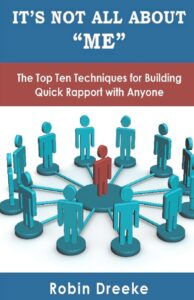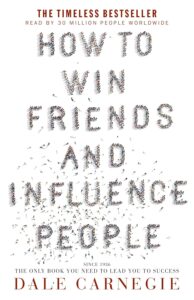
Building Rapport Quickly: Master the Art of Instant Trust Now
When you walk into a room, do you wish you could instantly connect with everyone? Whether you’re at a networking event, a job interview, or a social gathering, building rapport quickly can make a huge difference. Imagine being the person everyone remembers and wants to talk to.
Get ready to discover the secrets to making those instant connections. Prepare to learn practical strategies and activities that you can start using right away. Soon, you’ll be making great first impressions and using humor and empathy to connect with just about anyone.
So, why is building rapport quickly so important? It’s simple: people are more likely to trust and like you if they feel a connection. Plus, it boosts your confidence and makes you more influential.
Ready to dive in and learn how to build rapport quickly? Let’s get started and turn you into a master of connections!
Understanding Rapport
What is Rapport?
Rapport is the feeling of connection and trust you build with someone. It’s that sense of being on the same wavelength, where conversations flow easily and both parties feel understood. Essentially, rapport is about creating a bond that makes interactions smooth and enjoyable. When you have rapport with someone, you both feel comfortable and engaged in the conversation.
Why Building Rapport Quickly Matters
Building rapport quickly can open doors in both your personal and professional life. When you connect with others right away, you create opportunities for deeper relationships, better collaborations, and more meaningful interactions. For instance, in a job interview, establishing rapport can make you stand out as a candidate who is not only qualified but also personable and easy to work with. Similarly, at a networking event, quick rapport can lead to valuable connections that might benefit your career or personal growth.
How Rapport Affects Relationships
Rapport plays a crucial role in how we relate to others. It helps in building trust, fostering cooperation, and creating a positive atmosphere. When you establish rapport, people are more likely to listen to you, support you, and engage with you. For example, in the workplace, having good rapport with colleagues can lead to better teamwork and collaboration. In social settings, it can make interactions more enjoyable and fulfilling. Moreover, rapport can enhance your influence, as people are more inclined to follow the lead of someone they feel connected to.
Real-Life Example of Rapport in Action
Imagine you’re at a networking event and meet someone who works in your industry. You start the conversation with a warm smile and a firm handshake. Asking questions about their work show your genuine interest. Listening actively, you discover a shared passion for the same hobby, leading to a lively discussion. Throughout the conversation, you use their name and recall details they mentioned earlier. By the end of the event, you’ve not only made a new professional contact but also laid the foundation for a potential friendship. This is the power of building rapport quickly – it turns a simple interaction into a meaningful connection.
Strategies for Building Rapport Quickly
Make a Good Introduction
First impressions matter. Start with a firm handshake, a warm smile, and maintain eye contact. It’s these simple actions set a positive tone. Additionally, a good introduction shows confidence and makes others feel comfortable right away.
Ask Engaging Questions

Show genuine interest by asking open-ended questions. Avoid questions that can be answered with a simple yes or no. This encourages the other person to share more about themselves. For example, don’t ask, “Do you like your job?” Instead, try, “What do you enjoy most about your job?”
Engaging questions help you find common ground and build a connection. They also show that you are genuinely interested in the other person’s thoughts and experiences. This can lead to deeper and more meaningful conversations. By asking open-ended questions, you also give the other person the opportunity to express themselves more fully. That can lead to a stronger rapport.
Use Humor
Appropriate humor can break the ice and make the conversation more enjoyable. For instance, a light joke or a funny story can create a relaxed and friendly atmosphere. However, make sure your humor is respectful and suitable for the situation.
Humor can be tricky, so keep it simple and positive. Therefore, avoid controversial or sensitive topics. Instead, share a funny anecdote or a lighthearted observation. For example, a humorous comment about the weather or a recent event can work well.
Remember, the goal is to make the other person feel comfortable and at ease. If you’re unsure about your joke, it’s better to skip it. Additionally, pay attention to the other person’s reactions. If they laugh or smile, you’re on the right track. On the other hand, if they seem uncomfortable, steer the conversation back to safer topics.
When building rapport quickly, using humor effectively can help make your interactions more memorable. Just be mindful of the context and the other person’s comfort level.
Remember Names and Details
Remembering and using the other person’s name shows you value them. Also, recalling details from past conversations shows you were paying attention. For example, if someone said they love hiking, ask about their latest hike. This personal touch can really help build rapport.
Using their name and remembering details makes the other person feel special. It shows you are truly interested in them. For instance, if they mentioned a recent trip, ask how it went. These small gestures can make a big difference in building a strong connection.
Lead with Empathy and Respect

Show empathy by acknowledging the other person’s feelings and perspectives. This means listening carefully and understanding their emotions. Respect their opinions and experiences, even if they differ from your own. For example, if someone shares a challenge they’re facing, respond with understanding and support. You might say, “That sounds really tough. I’m here for you.” This approach fosters trust and mutual understanding.
Additionally, showing empathy helps the other person feel heard and valued. It’s important to validate their feelings by saying things like, “I can see why you feel that way.” This shows that you respect their emotions and are willing to see things from their point of view. By doing this, you create a safe space for open and honest communication, which is key to building strong relationships.
Find Commonalities
To determine what commonalities you have with someone, start by asking open-ended questions. Remember, we discussed earlier how these questions encourage the other person to share more about themselves. For example, ask about their hobbies, interests, or recent activities. Listen carefully to their responses to find shared interests.
Discovering and discussing shared interests or experiences can quickly build a sense of connection. Look for common ground to strengthen your rapport. For example, if you both enjoy a particular sport, discuss recent games or favorite teams. Shared interests create a natural bond.
Be Genuine and Authentic
People can tell when someone is not being sincere. So, being genuine helps build trust and rapport more effectively. Authenticity is key to meaningful connections. For example, share your true thoughts and feelings instead of what you think others want to hear.
When you are authentic, others feel more comfortable and open up to you. This creates trust and mutual respect. Being genuine means being honest about your own experiences and emotions. By being true to yourself, you show that you value the other person and the connection you are building.
Follow Up
Whenever possible, after an initial meeting, follow up with a message or call. This shows that you value the connection and are interested in maintaining it. A simple “It was great meeting you” message can reinforce the rapport you’ve built. Following up keeps the connection alive and shows your commitment.
Overcoming Challenges
Dealing with Nervousness
Feeling nervous in social situations is completely normal. As noted in a Healthline article, “Nervousness is your body’s way of preparing you for what’s coming, which is usually something that’s outside your comfort zone.”
To stay calm and confident, practice deep breathing exercises before engaging in conversations. For example, take a deep breath, hold it for a few seconds, and then slowly exhale. Positive self-talk can also help. Remind yourself of past successes and focus on the present moment. Visualization techniques, where you imagine a successful interaction, can boost your confidence.
Additionally, prepare some conversation starters in advance. Having a few topics ready can reduce anxiety. Practice active listening, which shifts the focus from your nervousness to the other person. Remember, everyone feels nervous sometimes, and it’s okay to take a moment to collect yourself.
Handling Rejection
Rejection is a part of life, and it’s important to learn how to handle it gracefully. As mentioned in an article by Barbara Greenberg Ph.D. on the Psychology Today website, “It is impossible to like, or to be liked, by everyone.”
When faced with rejection, focus on the positive aspects of the interaction. Reflect on what you can learn from the experience and use it as an opportunity for growth. Keep in mind that rejection is not a reflection of your worth.
Additionally, practice self-compassion. Treat yourself with the same kindness you would offer a friend. Engage in activities that boost your mood and self-esteem. Stay resilient and keep trying. Each interaction is a chance to improve and build stronger connections. By viewing rejection as a learning experience, you can develop greater resilience and self-awareness. Surround yourself with supportive people who uplift you and remind you of your strengths.
Rejection in Social Situations
Rejection in social situations, like approaching someone you’re interested in, can be tough. Remember, it’s normal to feel disappointed, but don’t let it discourage you. Focus on the courage it took to make the approach. Reflect on what you did well and what you could improve for next time. Understand that everyone faces rejection, and it’s a part of building meaningful connections.
Rejection in Professional Situations
In professional settings, rejection can feel particularly personal, whether it’s from a job interview, asking for a raise, or requesting time off. It’s important to separate your self-worth from the outcome. Use the experience to identify areas for growth. Seek feedback if possible, and use it constructively. Remember, persistence and resilience are key. Each rejection brings you one step closer to success. Surround yourself with colleagues and mentors who support and encourage you.
Adapting to Cultural Differences
In our increasingly globalized world, it’s essential to be mindful of cultural differences. When interacting with people from different backgrounds, show respect and curiosity about their culture. Ask questions and be open to learning from diverse perspectives. Adapt your approach to be more inclusive and considerate. This not only helps in building rapport but also enriches your own understanding and appreciation of different cultures.
Activities to Improve Rapport-Building Skills
Role-Playing Exercises
Role-playing helps you practice conversations in different scenarios. Here’s how to do it:
- Find a Partner: Ask a friend or mentor who is willing to help you practice. Explain that you want to improve your conversation skills.
- Choose a Scenario: Decide on a specific situation to role-play, such as a job interview, a networking event, or a casual social gathering. Be clear about the context and roles each of you will play.
- Set the Scene: Create a realistic setting for the scenario. For example, if it’s a job interview, sit at a table and dress appropriately. If it’s a networking event, stand and move around as you would in a real event.
- Practice: Start the role-play by introducing yourself and engaging in conversation. Use the tips we’ve discussed, like making a good introduction, maintaining eye contact, and asking open-ended questions. Try to keep the conversation flowing naturally.
- Review: After each practice session, sit down with your partner and discuss what went well and what could be improved. Focus on specific aspects like body language, tone, and the flow of conversation. Take notes on the feedback you receive.
Observation Tasks
Observing others can teach you effective techniques for building rapport quickly. Follow these steps:
- Watch Interactions: Spend time observing people in different settings, such as at work, social events, or even on TV shows. Pay attention to how they interact with each other.
- Take Notes: Carry a notebook or use your phone to jot down observations. Note what works well and what doesn’t. Pay attention to body language, tone of voice, and how the conversation flows.
- Focus on Details: Look for specific behaviors that help build rapport, such as smiling, nodding, and maintaining eye contact. Notice how people use gestures and facial expressions to communicate.
- Learn and Apply: Reflect on your observations and think about how you can incorporate successful strategies into your own interactions. Practice these techniques in your daily conversations.
Getting feedback helps you improve your social skills. Here’s how to do it:
- Ask for Feedback: After a social interaction, ask trusted friends, close co-workers, or mentors for their honest opinion. This can be after real interactions or during role-playing sessions. Be specific about the type of feedback you’re looking for.
- Specific Questions: Ask targeted questions such as, “Did I make a good first impression?”, “Were my questions engaging?”, and “Did I seem genuine and attentive?”. Encourage them to provide detailed feedback.
- Listen and Learn: Pay close attention to their feedback. Ask for specific examples to understand their perspective better. Avoid being defensive and take their comments as constructive criticism.
- Apply Feedback: Use their feedback to identify areas for improvement. Make a plan to work on these areas and practice regularly. For example, if you need to improve your eye contact, focus on maintaining eye contact in your next conversation.
Journaling
Journaling helps you reflect on your interactions and identify patterns. Try these steps:
- Daily Writing: Set aside time each day to write about your conversations and social encounters. Be consistent with this practice.
- Note Successes: Record moments when you felt a strong connection with someone. Write down what strategies you used and why you think they worked.
- Identify Challenges: Note times when the conversation felt awkward or forced. Reflect on what might have caused these feelings and what you could do differently next time.
- Analyze and Improve: Review your journal entries regularly to identify patterns and areas for improvement. Use your reflections to understand what works and what doesn’t. Apply these insights to future interactions to improve your rapport-building skills over time.
Real-Life Applications
Networking Events
Networking events are prime opportunities to practice building rapport quickly. Start with a strong introduction, using a firm handshake and a warm smile. Ask engaging questions to show genuine interest in the other person. Use humor to lighten the mood and make the conversation enjoyable. Remember to follow up after the event with a message or call to maintain the connection. These steps can help you stand out and create lasting professional relationships.
Workplace Interactions
Building rapport with colleagues and clients can lead to better teamwork and collaboration. Show genuine interest in your coworkers’ lives by asking about their weekend or their hobbies. Use humor appropriately to create a friendly atmosphere. Find common ground by discussing shared interests or experiences. Remember to be genuine and authentic in your interactions. These efforts can foster a positive work environment and strengthen professional relationships.
Social Settings
In social settings, connecting with new people can be both fun and rewarding. Start by making a good introduction and using the person’s name. Ask open-ended questions to encourage them to share more about themselves. Use humor to make the conversation enjoyable and memorable. Show empathy and respect for their opinions and experiences. Follow up after the initial meeting to show that you value the connection. These strategies can help you build meaningful relationships in casual environments.
Recommended Reading on Building Rapport Quickly

It’s Not All About “Me” by Robin Dreeke

The Like Switch: An Ex-FBI Agent’s Guide to Influencing, Attracting, and Winning People Over by Jack Schafer and Marvin Karlins

The Charisma Myth: How Anyone Can Master the Art and Science of Personal Magnetism by Olivia Fox Cabane

How to Win Friends and Influence People by Dale Carnegie
Building Rapport Quickly and the Power of Instant Connections
Building rapport quickly can transform your interactions and open up new opportunities. By using these strategies and activities, you’ll become a master at making instant connections. So, start practicing today and watch your relationships flourish!
Remember, the key to building rapport quickly lies in genuine interest, empathy, and authenticity. As Dale Carnegie famously said in his book How to Win Friends and Influence People, “You can make more friends in two months by becoming interested in other people than you can in two years by trying to get other people interested in you.”
Ready to take your rapport-building skills to the next level? Don’t miss out on the chance to enhance your social skills and boost your confidence. Sign up for our email list now for more insights and updates! Join our community today and start making meaningful connections. Act now and unlock the secrets to instant connections!





